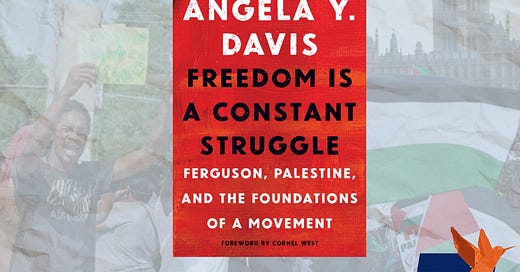The Struggle for Liberation Continues
Read Freedom is a Constant Struggle by Angela Y. Davis with us!
Happy New Year! Have you started reading the book we announced last month, Freedom is a Constant Struggle: Ferguson, Palestine, and the Foundations of a Movement by THEE Angela Y. Davis? If you took a break for the holidays, no worries. The month is still young, and there’s plenty of time to join in.
Save the date and register for our monthly discussion: Wednesday, January 31, 2024 at 5pm Central/6pm Eastern!
It may seem obvious that Freedom is a Constant Struggle is a critical selection for a time such as this, as genocide rages on and we see people punished for daring to demand an immediate ceasefire and a free Palestine.
In the midst of winter descending in the region, against continued outcries and the reality that the population in Gaza is being systematically starved to death, the response from the U.S. government continues to defy the will of millions of people organizing, marching, and protesting to bring the assault in Gaza to an end.
What have we seen instead? Clear lines have been drawn by institutions that serve Empire and the status quo. We have witnessed explicit and material support given to Israel by the U.S. government. History teaches us that the voice of the state will always support itself and its allies. We know that the actions and lack thereof of our government are in keeping with the ideology of our own settler colonialist project.
In the years leading up to the Civil War, the U.S. government and its agents defended the institution of slavery to the bitter end. It was the public’s outcry, and the campaign waged in the writings of early abolitionists exposing slavery’s horrors that eventually ushered in a tide of change (see Confronting the Racist Legacy of the American Child Welfare System for more on this).
We are at an eerily similar moment. History recycles, repeats, and also advises that we must continue our outcry against the atrocities we are witnessing today. Our voices, our strength, and our will matter.
Last week, we saw the resignation of the second Ivy League university president, who came under fire during congressional hearings on antisemitism on College campuses. Harvard’s President Claudine Gay resigned on January 2. (The University of Pennsylvania’s Liz Magill resigned on December 9.) For the ousting of Claudine Gay (And Liz Magill before her), we must not misread or misunderstand this moment.
While conservatives led the charge in demanding the resignation of all three Ivy League presidents who testified at the hearings, criticism of their testimonies came from both sides of the aisle and the White House. It would be easy to blame conservatives for the attacks, particularly on Claudine Gay, as part and parcel with the history of anti-blackness in this country that typically follows Blacks who ascend to the upper echelons of leadership and power. History’s record on that is clear. And yes, many of the attacks have been vile and racist.
Yet, Gay’s resignation in the context of this moment has more to do with her testimony at the hearings. All three testimonies were criticized for not being strong enough. And on their campuses, where students were rising up to demand a ceasefire AND liberation for Palestine, the expectation was that University administrations use their power to quell the voices of opposition in support of the status quo, which has been unquestioned support for Israel.
While the accusations of plagiarism dominated headlines of Gay’s resignation, it was only after her testimony that the allegations even surfaced. It is critical to note that those accusations were given top billing not by conservatives but by the bastion of liberalism, the New York Times, which, we should also note, has been called out repeatedly for biases and flat-out inaccuracies throughout Israel’s assault on Gaza.
If you read Except for Palestine with us last Fall, you may recognize that what we see is consistent with the book’s premise:
“We examine the various ways that Palestine is often positioned as exceptional among those who identify as liberal as well as “center-left,” “progressive,” and sometimes even “radical.” While these communities generally endorse ideologies, policies, practices, and protests that reflect their worldview, they often become notably silent about the plight of Palestinians.”
– Marc Lamont Hill and Mitchell Plitnick, Except for Palestine
For the past 80+ days, we have witnessed the deafening silence described in Except for Palestine. Still, more than that, we have had a front seat to the complicity the U.S. government has exercised for decades in the occupation of Palestine and persecution of Palestinians. We have also witnessed the McCarthy-esque hunts to attack and punish people who dare to speak out, or in Gay’s and McGill’s cases, don’t use their power to punish others (students) who dare to speak out forcefully enough.
And so we begin the year with this selection to deepen not only our understanding but our allegiance with the struggle of Palestinians as we continue to demand a ceasefire and a free Palestine.
Liberation is our birthright and must be named, claimed, and fought for. Despite the heaviness and prolonged exposure to horror, in fact because of it, we can’t give up, not on ourselves and not on Gaza, Sudan, the Congo, Haiti, or anywhere in the world where people are oppressed, killed, and denied their inalienable right to liberation. Their struggle is ours, and ours is theirs. As bell hooks once said,
”It is crucial for the future of the Black liberation struggle that we remain ever mindful that ours is a shared struggle, that we are each other’s fate.” –bell hooks
Join us to explore why Angela Y. Davis describes freedom as a constant struggle.








